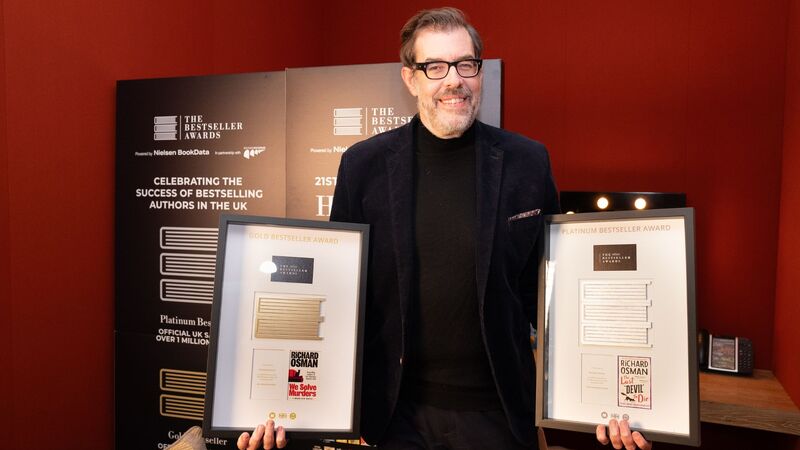You are viewing your 1 free article this month. Login to read more articles.
BA Conference round-up
Hot, sexy, and exciting: the buzz words of the catwalk replaced the more sedate vocabulary of bookselling at the annual conference of the Booksellers Association in Brighton this week. Delegates were also reminded that they faced an uncertain future, in which retail values will be driven by customer demand, not retailer supply.
In a wide-ranging opening address, BA president Martin Grindley warned that the explosion in high street bookselling space had left too much stock chasing too few customers. "Let's face it: most towns and cities are not just at full capacity with bookselling space, they are saturated . . . How did the chains get hung up on this stockholding fixation?"
Customers were suffering from what had been described as "Retail Fatigue Syndrome", where consumers were "boggled" by shops the size of aircraft hangars.
The same unscientific approach used to fuel the expansion of retail space had provoked "crazy" levels of discounting. "Before the rug was pulled out from the Net Book Agreement, people used to talk about discounting as a marketing tool to be used like a scalpel. To me, it looks like it's being used as a bludgeon, picked up by the desperate in the bloody ruck for market share with no real winners."
The problem of unprofitable retail space was compounded by British property law, which left retailers with the burden of leases they could no longer afford.
Discounting, coupled with the homogenisation of the high street book offer, meant that, for consumers, there was little to differentiate one bookseller from another. As a result, branding was more important than ever, yet booksellers had been slow to recognise this. Booksellers should emulate "hot and sexy" fashion retailers such as FCUK and Jigsaw. "By and large, I don't see sumptuous bookshops. I don't see cool. I don't see innovation. I see lots of cold, fluorescent lighting, crummy cheap carpets, tacky shelving and lots of sharp, masculine fittings."
Mr Grindley, who runs the independent Browsers Bookshop, said that branding should be more women-friendly, and that it should address directly the greying baby-boomer generation. Babyboomers were an ideal market for booksellers, well educated, with high disposable incomes.
According to Publishers Association president David Kewley, the book trade was failing another social group with high disposable income, namely the 18–34 age group.
Despite a two-thirds rise in recreational consumer spending between 1990 and 1998, spending on books increased by only 38%; there had been much larger spending increases on the cinema, video games, records and magazines.
BA support for Book Tokens plan
There was a clear majority among delegates at the BA's a.g.m. in favour of proposals by Book Tokens Ltd to allow non-BA members to sell book tokens, but to restrict their exchange solely to BA members.
Book Tokens chairman Richard Barker told delegates that by allowing new outlets to sell the tokens, booksellers would benefit through increased book sales and a better-funded BA.
A show of hands revealed about three-quarters of those present in favour, although a significant minority voiced their misgivings. Jane Streeter from the Bookcase in Nottingham suggested that sales of tokens through other retailers might result in a reduction in footfall through bookshops.
No decision on the matter was made at the a.g.m. The BA Council will discuss plans to consult members more widely.
World Book Day on the move again
World Book Day looks likely to move again from its traditional 23rd April date, because it coincides with school holidays and the BA's annual conference, which will take place next year from 22nd to 24th April in Manchester.
Not all delegates at the BA's a.g.m. were happy that WBD might move from its traditional date for a second year running. Inge Sweetman from City Books in Hove said: "It is World Book Day and it becomes a joke if we [in the UK] move it every year."
However, many accepted that it was essential that the day be held during term time.
Shingleton peers into bookselling future
A future dictated by "plural delivery formats" that can undermine established brands means booksellers will have to play to their strengths of creating customer loyalty through quality service, Bob Shingleton, e-commerce and sales director of Bertrams, told delegates in a packed session at the BA conference.
Sharing a platform with Beverley Hodson, m.d. of WHS High Street, and Adair Turner, former director-general of the CBI, Mr Shingleton made a series of predictions about the way e-commerce would affect bookselling in the next five years. He warned against complacency even among well-established brand names, citing the Encyclopaedia Britannica's eclipse by Microsoft's Encarta in the early 1990s as an example of how new formats threatened established market leaders.
Closer to home he pointed to the impact that Internet bookselling, with only a 4% share of the UK market, had made on sales of books through traditional outlets last Christmas.
But booksellers have one important weapon against the new entrants to the market. Mr Shingleton said that customer service and range were essential for his second prediction about the shape of things to come: generating brand loyalty, or as he termed it, "stickiness".
Traditional independent booksellers were very good at generating the ingredients essential to creating stickiness. "One of my main messages to the independent booksellers here today is re-invent yourselves over the next five years by focusing on what you are good at, and historically that has been `service'."
Independents would be better placed to fight off the service and range offers of their bigger competitors if they responded to Mr Shingleton's third prediction about the future: the emergence of "hyper-player groupings", which, through vertical integration, would remove conventional boundaries. He cited WHS and Bertelsmann as examples.
The emergence of these global players did not herald the death of independents, because the latter could take active steps to strengthen their own position through co-operative networks and links with larger organisations such as wholesalers. These larger organisations would be able to deliver a package of benefits that transcended the scale of the small bookseller.
The emergence of hyper-groupings also heralded what Mr Shingleton referred to as "the death of the channel". "My thesis is that by 2005 the concept of the discrete channel will be dead, and that virtually every major player will be involved in all channels. The high street, PC, mobile phone or television will simply be different routes for reaching the same book buyer."
Within this scenario, he predicted that publishers would begin selling their own books through Internet sites, and that there would be important and rapid developments that would reinforce the trend for vertical integration, resulting in the emergence of publishers as aggressive booksellers. This trend had already manifested itself as "sites within sites", such as Penguin Classics within Amazon.co.UK.
Mr Shingleton summed up by predicting that the bookseller best placed to face the trends shaping his or her future would be "prepared to embrace multiple delivery media and be part of a co-operative network, and that means being a 360-degree all-rounder".
Spirit of independence is thriving, says Poet Laureate
Poet Laureate Andrew Motion spoke to the conference as an author, reviewer, teacher and former publisher, he worked as editorial director in the 1980s at Chatto, and later at Faber.
The spirit of independence continues to thrive at those firms, he said, even though the former was now part of an international publishing conglomerate.
In his capacity as a teacher of creative writing at the University of East Anglia, he also noted grounds for optimism: eight UEA graduates, two of whom had been paid more than £200,000, had first novels to be published soon, and three poets from the course had recently found publishers. On being appointed Poet Laureate, Mr Motion determined that there was "a massive amount to do for poetry in relation to education".
'Mobility is the key to future'
Attempts by several delegates during Monday's business sessions to gaze into the future of e-commerce led to some dramatic predictions. The most urgent were from Kent Freeman, chief technology officer for US wholesaling giant Ingram. Mr Freeman forecast that some online booksellers would start to run out of money in the coming months. He predicted that consolidation in the sector was imminent and that mergers between online and bricks and mortar booksellers were likely.
Evidence suggested that online book sales were not growing the overall book market, but were taking market share from other existing channels. "Traditional booksellers are losing volume. We are seeing a lot of pressure on traditional booksellers." However, opportunities would exist for players who could take advantage of the nascent online education market.
According to Bob O'Keefe, professor of information management at Brunel University, in the next few years many goods and services would be ordered using mobile phones. "Recent evidence suggests that young people want mobility and social interaction, not computers. The future is not the Internet: the future is mobile. The Internet is dead," Professor O'Keefe said.
New mobile phone licences would enable telecommunication licencees to provide large amounts of information through mobile devices faster than existing computers.
Despite the growing importance of e-commerce, estimates suggested that European e-commerce expenditure would overtake the US in 2002, many online retailers knew too little about their customers and how best to interact with them, he said. He added that they had much to learn about the best ways to build Websites.
Online retailers also had to realise that users went to different sites and services for different things. Book buyers would trust sites that reflected their cultural and social mindsets to provide reviews and advice, but would better trust other, more established, brand names to deliver them.
Looking into the slightly more distant future, Alexander Broich, managing director of Bol.com, provided an overview of the questions surrounding the future of the e-book. Mr Broich warned that e-books would not have to become ubiquitous to affect the structure of the book industry. "Even if e-books took 10% of the market it would still have a substantial impact on the book business. There are relatively low barriers of entry."
Each set of players in the book trade had their own dream of cutting out other intermediaries in the supply chain, he said. The winners were likely to be publishers, authors and online booksellers, and traditional booksellers and wholsalers would have to reinvent their businesses if they were to benefit.
Book trade needs brands
Cassell managing director John Mitchinson told delegates that the book industry needed a call to arms to make it look again at the way it branded itself.
The scarcity of big brand names from the book trade in comparison to those from other sectors, such as Gap, Guinness and Virgin, was shameful, Mr Mitchinson said. Huge opportunities to brand publishers and booksellers in better ways were being missed.
"The book industry is woefully under-branded. Most publishers do nothing to present themselves as more than holders of copyright. In the retail sector, most booksellers, however innovative and plucky, are not big enough or noticeable enough to change properly perceptions of their role. We prefer to get by, unnnoticed by the public, suffering under the yoke of too many titles and a marketing ethos of 'Out Now'."
According to Mr Mitchinson, there were only five genuine book trade brands: Penguin, Amazon. com, Waterstone's, Dorling Kindersley and Oxford University Press.
PA faces the music
While the Booksellers Association conducted its annual general meeting, the Publishers Association forum discussed new technologies that might bypass retailers. Bob Mewton, a music lawyer, discussed the impact on the music industry of MP3 and other online methods of delivery. Ingo Reese of NuvoMedia demonstrated the potential of the Rocket eBook.
The first Internet-only album by a big-name act, the Black Crowes and Jimmy Page, has already appeared. A number of other leading artists, including David Bowie, have made music available on the Web, and many up-and-coming bands are using the Web to make their work available. Mr Mewton said described how leading record labels such as Sony were negotiating contracts that included ownership of artists' Websites; and how songwriters, meanwhile, were attempting to negotiate multi-layered deals with separate provisions for digital, film and so on. Music publishers, he said, were "busy hoarding and buying copyrights". Music retailers, like their counterparts in the book world, faced "a tough challenge in differentiating between the instore experience and the online one".
Mr Mewton predicted that the proposed AOL/Time Warner merger "could be about to kick-start the Internet music revolution". For the first time, the record industry was gaining access to a huge number of Internet users.
Mr Reese passed round the audience a Rocket eBook containing Stephen King's recent e-novel Riding the Bullet and several other titles. He said that the next version of the hardware, which would be up to 30% lighter and which would contain a built-in modem, would be available at the end of the year.
Kip Bertram backs BTBS appeal
A £1m appeal launched at the Booksellers Association conference by BTBS (formerly known as the Book Trade Benevlolent Society) has been given a head start by former Bertrams chairman Kip Bertram, who donated more than £125,000. BTBS is raising funds to redevelop its sheltered housing and community facilities.
The appeal will enable the charity to redevelop its existing sheltered accommodation at The Retreat in Hertfordshire and to expand its community facilities and accommodation for single people.
Sally Whitaker, president> of BTBS, said: "The overall cost is more than £1m. That sounds like an awful lot of money to most of us, but some individual people and some companies in the book trade have been extremely successful financially over the past several years.
"If 20 companies donated £50,000 each, the money would be easily raised."
Mr Bertram's donation, together with donations from the Stanley Unwin Foundation, the Joseph Family Trust and Ms Whitaker, have already raised the first £0.25m for the project.













